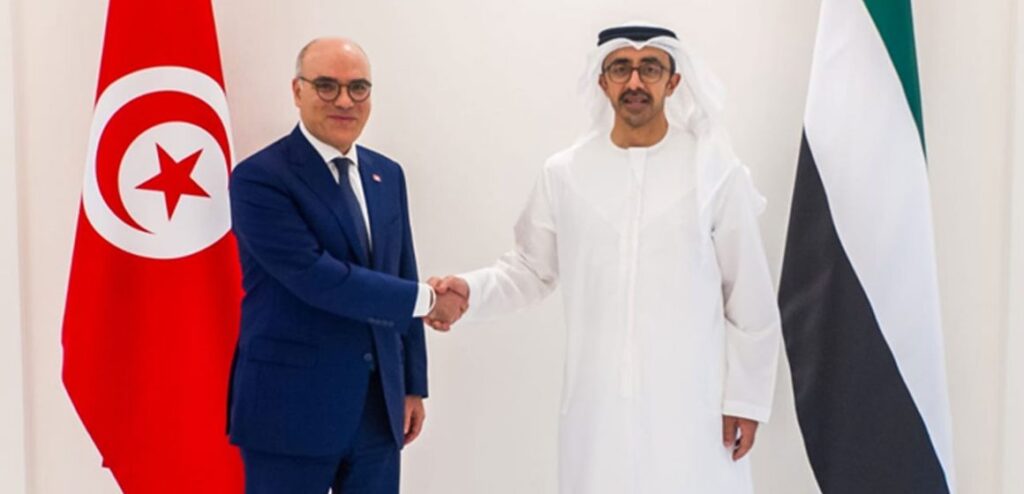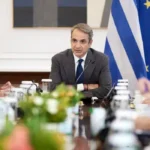Will Tunisia be able to mobilize from the Gulf countries the 3 billion dollars of co-financing required by the International Monetary Fund (IMF) to release the loan of 1.9 billion promised since last October, and not yet granted? Hope is allowed… (Illustration: handshake between Nabil Ammar and Abdallah Bin Zayed Al-Nahyan, head of Emirati diplomacy).
By Imed Bahri
The Minister of Foreign Affairs, Nabil Ammar, began, on Sunday July 16, 2023, in Kuwait City, a tour of several Gulf countries which will also take him, until July 20, to the United Arab Emirates and Saudi Arabia. On the program, in addition to meetings with his counterparts, meetings with heads of development, financing and investment funds, as well as heads of chambers of commerce and other economic operators.
The unannounced objective of this tour: to mobilize co-financing guaranteeing the loan of 1.9 billion dollars expected from the IMF.
The Gulf countries are among Tunisia’s historical donors, but their commitment alongside our country weakened a lot in the aftermath of the January 14, 2011 revolution, which was moderately appreciated – to put it mildly – by the monarchies. families prevailing in these countries.
Death of the “Arab Spring”
The fear of the contagion of the “Arab Spring” seems to have pushed the Gulf States to bet on the failure of the democratic transition in our country. And their wishes were soon granted by the economic failure of all the successive governments in Tunis over the past decade and, above all, the proclamation of a state of exception by President Kaïs Saïed. , July 25, 2021, and the return to Tunisia of an authoritarian regime like the region of the Middle East and North Africa knows how to give birth to.
However, this development in accordance with their wishes does not seem to have dispelled the fears and reservations that the “Arab brothers” of the Gulf have towards us. They have, in any case, continued to hold the current strongman in Carthage in suspicion and to apprehend his Arab nationalism, his noisy anti-Zionism and his vaguely revolutionary impulses (major faults in their eyes) which remind them of a former North African leader who gave them a hard time for a long time, Muammar Gaddafi in this case.Also, and despite the lobbying of certain European leaders, particularly Italian ones, in favor of Tunisia, the Gulf monarchies have not shown much willingness to provide our country with the financial support it needs to finance its budget, pay its debts, and revive its broken economy. As for the major investment projects announced with great fanfare before 2011, they have all been put on hold and there is no indication that they will soon be relaunched.
Tunisia back in the ranks
It is in this context that the visit of the Minister of Foreign Affairs to the Gulf countries takes place. The goal is to try to mobilize some of the additional funds required by the IMF before giving its final agreement for the loan of 1.9 billion dollars, promised since last October and which is slow to be granted.
“We know that the IMF will not be able to exceed a certain threshold in the financing of countries in budgetary difficulty and in urgent need of international loans. Generally, the IMF finances a third, and requires that the additional 2/3 come from other sources of financing”, explains the economist Moktar Lamari in a post published Monday, July 17 on his blog Economics for Tunisia, E4T. He adds: “If the European Union mobilizes 1.1 billion dollars, it will still take almost 3 billion dollars to be mobilized by other sources of financing. All to reach the 2/3 required, the other third having to come from the IMF (1.9 billion dollars).
It remains, however, to know the political arguments that Mr. Ammar will put forward in discussions with his counterparts in the Gulf to overcome their resistance and convince them of the interest they would have in once again extending the pole to a Tunisia finally back in the ranks and returned from its democratic illusions.
This article is originally published on kapitalis.com







